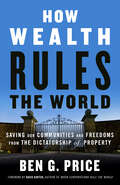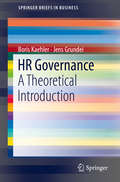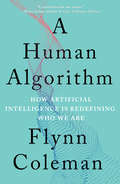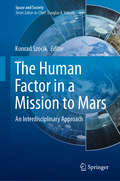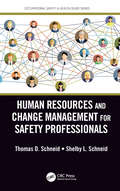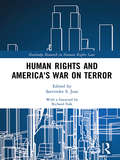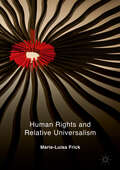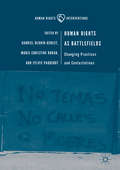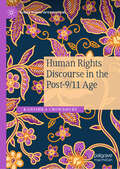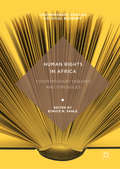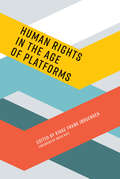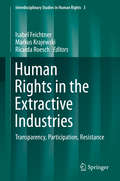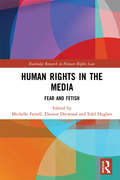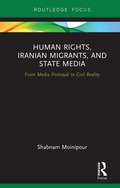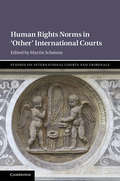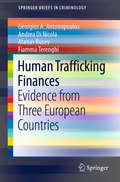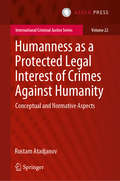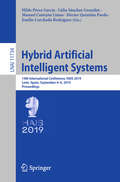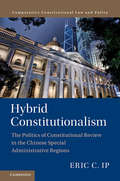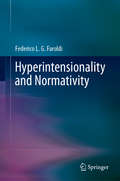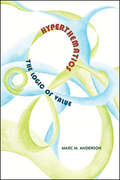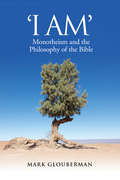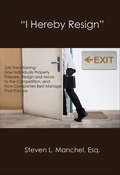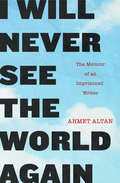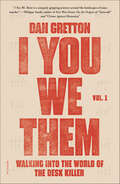- Table View
- List View
How Wealth Rules the World: Saving Our Communities and Freedoms from the Dictatorship of Property
by Ben G. PriceMany of today's most serious issues—homelessness, gun violence, fracking, prison privatization, predatory lending, and many more—resist resolution because the “rights of property” undermine the rights of people. Issues that undeniably affect whole communities are determined by the courts to relate primarily to property, contracts, and corporations and are removed from the public sphere and immunized from public governance. There's a reason for this. Ben Price tells the story of how the Federalists—the more conservative faction of the Founding Fathers—secretly drafted the Constitution as a counterrevolutionary document. It restored to the colonial 1 percent privileges overturned by the revolution, avoiding a popular backlash by bestowing rights on wealth itself, rather than creating a British-style personal aristocracy. These rights of property deprive the majority of their ability to self-govern and weaponize government in ways that let the “minority of the opulent” (in James Madison's phrase) use the Constitution to block local policies that compete with their interests. Price details often shocking examples of how the supposedly unalienable rights of individuals and communities are blithely disregarded. But he also describes how over 200 communities have drafted their own bills of rights that push back against the primacy of property and how we all can join this struggle to return America to what the revolutionary generation intended.
HR Governance: A Theoretical Introduction (SpringerBriefs in Business)
by Boris Kaehler Jens GrundeiHuman resource (HR) governance is a relatively new construct that has recently begun attracting more and more attention in both research and practice. As a part of corporate governance, it represents the internal and external normative framework of human resource management and its supervision in organizations. This book theoretically integrates HR governance with the related domains of corporate governance, general management, HR management, and leadership. By doing so, it provides scholars and practitioners in the field with a precisely delineated system of theoretical concepts for their work and helps to translate these concepts into concrete research questions and practical guidelines. By interpreting the new ISO 30408 norm on human governance and taking into account recent developments, the book helps to comply with and anticipate current and future HR regulations.
A Human Algorithm: How Artificial Intelligence Is Redefining Who We Are
by Flynn ColemanA groundbreaking narrative on the urgency of ethically designed AI and a guidebook to reimagining life in the era of intelligent technology.The Age of Intelligent Machines is upon us, and we are at a reflection point. The proliferation of fast–moving technologies, including forms of artificial intelligence akin to a new species, will cause us to confront profound questions about ourselves. The era of human intellectual superiority is ending, and we need to plan for this monumental shift.A Human Algorithm: How Artificial Intelligence Is Redefining Who We Are examines the immense impact intelligent technology will have on humanity. These machines, while challenging our personal beliefs and our socioeconomic world order, also have the potential to transform our health and well–being, alleviate poverty and suffering, and reveal the mysteries of intelligence and consciousness. International human rights attorney Flynn Coleman deftly argues that it is critical that we instill values, ethics, and morals into our robots, algorithms, and other forms of AI. Equally important, we need to develop and implement laws, policies, and oversight mechanisms to protect us from tech’s insidious threats.To realize AI’s transcendent potential, Coleman advocates for inviting a diverse group of voices to participate in designing our intelligent machines and using our moral imagination to ensure that human rights, empathy, and equity are core principles of emerging technologies. Ultimately, A Human Algorithm is a clarion call for building a more humane future and moving conscientiously into a new frontier of our own design.“[Coleman] argues that the algorithms of machine learning––if they are instilled with human ethics and values––could bring about a new era of enlightenment.” —San Francisco Chronicle
The Human Factor in a Mission to Mars: An Interdisciplinary Approach (Space and Society)
by Konrad SzocikA manned mission to Mars is faced with challenges and topics that may not be obvious but of great importance and challenging for such a mission. This is the first book that collects contributions from scholars in various fields, from astronomy and medicine, to theology and philosophy, addressing such topics. The discussion goes beyond medical and technological challenges of such a deep-space mission. The focus is on human nature, human emotions and biases in such a new environment.The primary audience for this book are all researchers interested in the human factor in a space mission including philosophers, social scientists, astronomers, and others. This volume will also be of high interest for a much wider audience like the non-academic world, or for students.
Human Resources and Change Management for Safety Professionals (Occupational Safety & Health Guide Series)
by Thomas Schneid Shelby SchneidThe goal of this book is to prepare safety and health professionals to recognize and address human resource issues, applicable laws and regulations, as well as change management techniques used to alter the safety culture within their operations. This book will provide awareness to avoid or address HR related policies/issues/laws which can result in costly litigation, grievances, and other negative implications. The book will address the "pitfalls" for safety professionals to avoid as well as provide the methodology to attain the cultural change necessary to achieve and maintain safety performance. <P><P>Features <li>Prepares safety professionals how to avoid or address HR issues and laws <li>Provides awareness of applicable labor and employment laws and regulations <li>Covers change management skills applicable to the safety function <li>Enables the safety professional to recognize legal requirements from everyday questions asked by employees <li>Helps safety professionals to prevent becoming entangled in legal issues resulting from their actions or inactions
Human Rights and America's War on Terror (Routledge Research in Human Rights Law)
by Satvinder S. JussThis volume examines the success of the 9/11 attacks in undermining the cherished principles of Western democracy, free speech and tolerance, which were central to US values. It is argued that this has led to the USA fighting disastrous wars in Afghanistan and Iraq, and to sanctioning the use of torture and imprisonment without trial in Guantánamo Bay, extraordinary rendition, surveillance and drone attacks. At home, it has resulted in restrictions of civil liberties and the growth of an ill-affordable military and security apparatus. In this collection the authors note the irony that the shocking destruction of the World Trade Center on 9/11 should become the justification for the relentless expansion of security agencies. Yet, this is a salutary illustration of how the security agencies in the USA have adopted faulty preconceptions, which have become too embedded within the institution to be abandoned without loss of credibility and prestige. The book presents a timely assessment of both the human rights costs of the ‘war on terror’ and the methods used to wage and relentlessly continue that war. It will be of interest to researchers, academics, practitioners and students in the fields of human rights law, criminal justice, criminology, politics and international studies.
Human Rights and Relative Universalism
by Marie-Luisa FrickThis book argues that human rights cannot go global without going local. This important lesson from the winding debates on universalism and particularism raises intricate questions: what are human rights after all, given the dissent surrounding their foundations, content, and scope? What are legitimate deviances from classical human rights (law) and where should we draw “red lines”? Making a case for balancing conceptual openness and distinctness, this book addresses the key human rights issues of our time and opens up novel spaces for deliberation. It engages philosophical reasoning with law, politics, and religion and demonstrates that a meaningful relativist account of human rights is not only possible, but a sorely needed antidote to dogmatism and polarization.
Human Rights as Battlefields: Changing Practices and Contestations (Human Rights Interventions)
by Gabriel Blouin-Genest Marie-Christine Doran Sylvie PaquerotThis book examines human rights as political battlefields, spaces that are undergoing constant changes in which political conflicts are expressed by a translation process within networks of interactions. This translation, in turn, contributes to modifying the scope and understanding of human rights. Ultimately, these battlefields express the legitimacy encounter of different versions of human rights in contemporary political practices. The volume thus challenges both the tendency to minimize the changing nature of human rights as well as the struggles emerging from the use of human rights discourses as a legitimization tool. By shifting the focus on what stakeholders do instead of solely on the origin, nature or foundations of human rights, the authors reveal that human rights are not static objects: they are constantly transformed and, as such, affect the horizon of universal rights.
Human Rights Discourse in the Post-9/11 Age (Human Rights Interventions)
by Kanishka ChowdhuryThis book offers a materialist critique of mainstream human rights discourse in the period following 9/11, examining literary works, critical histories, international declarations, government statutes, NGO manifestos, and a documentary film. The author points out some of the contradictions that emerge in contemporary rights language when material relations are not sufficiently perceived or acknowledged, and he directs attention to the role of some rights talk in maintaining and managing the accelerated global project of capital accumulation. Even as rights discourse points to injustices—for example, injustices related to labor, gender, the citizen’s relationship to the state, or the movement of refugees—it can simultaneously maintain systems of oppression. By constructing subjects who are aligned to the interests of capital, by emphasizing individual “empowerment,” and/or by containing social disenchantment, it reinforces the process of wealth accumulation, supports neoliberal ideologies, and diminishes the possibility of real transformation through collective struggle.
Human Rights in Africa: Contemporary Debates and Struggles (Contemporary African Political Economy)
by Eunice N. SahleThis edited collection explores key human rights themes and situates them in the context of developments on the African continent. It examines critical debates in human rights bringing together conceptually and empirically rich contributions from leading thinkers in human rights and African studies. Drawing on scholarly insights from the fields of constitutional law, human rights, development, feminist studies, public health, and media studies, the volume contributes to scholarly debates on constitutionalism, the right to water, securitization of development, environmental and transitional justice, sexual rights, conflict and gender-based violence, the right to development, and China’s deepening role in Africa. Consequently, it makes an important scholarly intervention on timely issues pertaining to the African continent and beyond.
Human Rights in the Age of Platforms (Information Policy)
by Rikke Frank JørgensenScholars from across law and internet and media studies examine the human rights implications of today's platform society.Today such companies as Apple, Facebook, Google, Microsoft, and Twitter play an increasingly important role in how users form and express opinions, encounter information, debate, disagree, mobilize, and maintain their privacy. What are the human rights implications of an online domain managed by privately owned platforms? According to the Guiding Principles on Business and Human Rights, adopted by the UN Human Right Council in 2011, businesses have a responsibility to respect human rights and to carry out human rights due diligence. But this goal is dependent on the willingness of states to encode such norms into business regulations and of companies to comply. In this volume, contributors from across law and internet and media studies examine the state of human rights in today's platform society.The contributors consider the “datafication” of society, including the economic model of data extraction and the conceptualization of privacy. They examine online advertising, content moderation, corporate storytelling around human rights, and other platform practices. Finally, they discuss the relationship between human rights law and private actors, addressing such issues as private companies' human rights responsibilities and content regulation.ContributorsAnja Bechmann, Fernando Bermejo, Agnès Callamard, Mikkel Flyverbom, Rikke Frank Jørgensen, Molly K. Land, Tarlach McGonagle, Jens-Erik Mai, Joris van Hoboken, Glen Whelan, Jillian C. York, Shoshana Zuboff, Ethan ZuckermanOpen access edition published with generous support from Knowledge Unlatched and the Danish Council for Independent Research.
Human Rights in the Extractive Industries: Transparency, Participation, Resistance (Interdisciplinary Studies in Human Rights #3)
by Isabel Feichtner Markus Krajewski Ricarda RoeschThis book addresses key challenges and conflicts arising in extractive industries (mining, oil drilling) concerning the human rights of workers, their families, local communities and other stakeholders. Further, it analyses various instruments that have sought to mitigate human rights violations by defining transparency-related obligations and participation rights. These include the Extractive Industries Transparency Initiative (EITI), disclosure requirements, and free, prior and informed consent (FPIC). The book critically assesses these instruments, demonstrating that, in some cases, they produce unwanted effects. Furthermore, it highlights the importance of resistance to extractive industry projects as a response to human rights violations, and discusses how transparency, participation and resistance are interconnected.
Human Rights in the Media: Fear and Fetish (Routledge Research in Human Rights Law)
by Michelle Farrell Eleanor Drywood Edel HughesThis collection sets about untangling some of the knotty issues in the underexplored relationship between human rights and the media. We investigate how complex debates in political, judicial, academic and public life on the role and value of human rights are represented in the media, particularly, in print journalism. To focus the discussion, we concentrate on media representation of the controversial proposals in the United Kingdom to repeal the Human Rights Act 1998 and to replace it with a British Bill of Rights. The collection is underpinned by the observation that views on human rights and on the proposals to repeal and replace are polarised. On the one hand, human rights are presented as threatening and, therefore, utterly denigrated; on the other hand, human rights are idolised, and, therefore, uncritically celebrated. This is the ‘fear and fetish’ in our title. The media plays a decisive role in constructing this polarity through its representation of political and ideological viewpoints. In order to get to grips with the fear, the fetish and this complex interrelationship, the collection tackles key contemporary themes, amongst them: the proposed British Bill of Rights, Brexit, prisoner-voting, the demonisation of immigrants, press freedom, tabloid misreporting, trial by media and Magna Carta. The collection explores media representation, investigates media polarity and critiques the media’s role.
Human Rights, Iranian Migrants, and State Media: From Media Portrayal to Civil Reality (Routledge Studies in Media, Communication, and Politics)
by Shabnam MoinipourThis book offers a detailed analysis of the Islamic Republic of Iran’s approach towards human rights in the media. It looks at the state-owned and state-controlled Islamic Republic of Iran Broadcasting (IRIB), employing content analysis and multimodal critical discourse analysis to explore its underlying strategies in portraying the international rights norms. The book also features analysis of surveys and interviews of recent Iranian migrants to determine the extent to which the Iranian public is aware of human rights principles and their views on whether and how the international rights norms are portrayed on IRIB.
Human Rights Norms in ‘Other' International Courts (Studies on International Courts and Tribunals)
by Martin ScheininThis unique book examines the role and impact of human rights norms in international courts other than human rights courts. It covers a whole range of courts and jurisdictions, looking at the practice of prominent international courts, such as the International Court of Justice and the International Criminal Court, as well as various fora of economic adjudication, including the World Trade Organisation, regional integration organisations in Europe and Africa, and investment arbitration. The book systematically explores the role of human rights norms at the International Tribunal for the Law of the Sea, thereby providing an insight into the future evolution of environmental law towards judicial enforcement at the international level. Within each jurisdiction under study, the respective authors, who all are experts within their fields, address the role of different categories of human rights, as well as the range of available modes of operation of human rights norms.
Human Trafficking Finances: Evidence from Three European Countries (SpringerBriefs in Criminology)
by Georgios A. Antonopoulos Andrea Di Nicola Atanas Rusev Fiamma TerenghiThis unique volume addresses the financial mechanisms that enable human trafficking - its actors, structures, and logistics. Viewing each stage of the market, human traffickers may need significant financial resources for recruitment, transportation, and exploitation. Drawing upon cross-disciplinary research expertise in criminology, sociology, law and economics, this book offers insights from law enforcement officers, policy makers, NGOs, and traffickers and their victims. Using three European countries - Bulgaria, Italy and the United Kingdom - it provides an account on the sources of capital for initiating and sustaining a human trafficking scheme, discussing the involvement of criminal structures, legitimate businesses, financial institutions, and information and communication technologies in the running of these enterprises. It also addresses the ways in which entrepreneurs and customers settle payments, the costs of conducting business in human trafficking, and how profits from the business are spent and invested.This important contribution to the transnational organized crime knowledge base will be of interest to researchers and academics, as well as law enforcement, regulatory agencies, and policy makers combating human trafficking.
Humanness as a Protected Legal Interest of Crimes Against Humanity: Conceptual and Normative Aspects (International Criminal Justice Series #22)
by Rustam AtadjanovCentral to this book is the concept of humanity in international law. It traces the evolution of that concept within international law, studies the existing theories of crimes against humanity, and lays out its own theory based on an inclusive view of “humanity”. Crimes against humanity are core crimes under international law; their modern definition is found in the Rome Statute. However, their protective scope remains unclear, with the exact meaning of “humanity” left undefined in law.The proposed theory argues that “humanity” should be understood as “humanness” and crimes against humanity should be criminalised because humanness constitutes these crimes’ valid protected interest. This volume in the International Criminal Justice Series offers an analysis of the German doctrine of Rechtsgut to justify the penalization of crimes against humanity at both domestic and international levels.This is the first monograph on crimes against humanity written by an author from the Commonwealth of Independent States (CIS) aimed at an international audience, and should constitute a useful tool for academics, students and practitioners of international law.Rustam Atadjanov, LLB, LLM, Dr.jur., attained his Ph.D. at the University of Hamburg in Germany and is a former Legal Adviser to the Regional Delegation of the International Committee of the Red Cross in Central Asia, Tashkent, Uzbekistan.
Hybrid Artificial Intelligent Systems: 14th International Conference, HAIS 2019, León, Spain, September 4–6, 2019, Proceedings (Lecture Notes in Computer Science #11734)
by Hilde Pérez García Lidia Sánchez González Manuel Castejón Limas Héctor Quintián Pardo Emilio Corchado RodríguezThis volume constitutes the refereed proceedings of the 14th International Conference on Hybrid Artificial Intelligent Systems, HAIS 2019, held in León, Spain, in September 2019. The 64 full papers published in this volume were carefully reviewed and selected from 134 submissions. They are organized in the following topical sections: data mining, knowledge discovery and big data; bio-inspired models and evolutionary computation; learning algorithms; visual analysis and advanced data processing techniques; data mining applications; and hybrid intelligent applications.
Hybrid Constitutionalism: The Politics of Constitutional Review in the Chinese Special Administrative Regions (Comparative Constitutional Law and Policy)
by Eric C. IpThis is the first book that focuses on the entrenched, fundamental divergence between the Hong Kong Court of Final Appeal and Macau's Tribunal de Última Instância over their constitutional jurisprudence, with the former repeatedly invalidating unconstitutional legislation with finality and the latter having never challenged the constitutionality of legislation at all. This divergence is all the more remarkable when considered in the light of the fact that the two Regions, commonly subject to oversight by China's authoritarian Party-state, possess constitutional frameworks that are nearly identical; feature similar hybrid regimes; and share a lot in history, ethnicity, culture, and language. Informed by political science and economics, this book breaks new ground by locating the cause of this anomaly, studied within the universe of authoritarian constitutionalism, not in the common law-civil law differences between these two former European dependencies, but the disparate levels of political transaction costs therein.
Hyperintensionality and Normativity
by Federico L. FaroldiPresenting the first comprehensive, in-depth study of hyperintensionality, this book equips readers with the basic tools needed to appreciate some of current and future debates in the philosophy of language, semantics, and metaphysics. After introducing and explaining the major approaches to hyperintensionality found in the literature, the book tackles its systematic connections to normativity and offers some contributions to the current debates.The book offers undergraduate and graduate students an essential introduction to the topic, while also helping professionals in related fields get up to speed on open research-level problems.
Hyperthematics: The Logic of Value (SUNY series in American Philosophy and Cultural Thought)
by Marc M. AndersonIn this innovative work, Marc M. Anderson presents an account of value and value creation, which both defines value and introduces a method to manipulate value practically. Using this new methodology, Anderson first explores where value lies in experience, both human and otherwise, uncovering tendencies in human action and the natural world that create and destroy value. From that analysis, he generates practical principles to be applied in creating value in any region or discipline of human experience, at any scale, including corporate organization and product design, economics, the sciences, the arts, urban and architectural design, and sustainable development. He tests this methodology by focusing on the organization and production of commercial corporations in particular, suggesting ways to rethink and transform organization, product creation, and the contemporary currency system. He considers the implications for the many intersections of corporate production with human life, from urban planning, medicine, and food production to pornography, weaponry, and environmental engagement, with corresponding suggestions for transformation toward value. Throughout, Hyperthematics examines complexity, the nature of objects, the inevitable future intermingling of science and ethics, and assumptions driving the contemporary culture wars.
"I AM": Monotheism and the Philosophy of the Bible
by Mark GloubermanFor whom was the Hebrew Bible written? How much truth does it contain? What, according to the Bible, is the place of men and women in the world? What connection is there between the Bible and morality? In "I AM" Mark Glouberman supplies new answers to these old questions. He does this by establishing that the foundational scripture of the West is, first and foremost, a philosophical document, not a theological tract, nor yet the religious history of a nation. The author identifies the Bible’s fundamental principle, the ontological principle of particularity. This principle, he shows, is what makes the Bible the revolutionary text that it is. God’s "I AM WHO I AM" asserts the principle, of which the Bible’s deity is a personified form. God’s self-identification also points to the real, anthropological, meaning of the ism called "monotheism." A portion of Glouberman’s book is devoted to illustrating the Bible’s live relevance in many of the areas where modern philosophers congregate, including moral philosophy, political philosophy, metaphysics, and epistemology. Isn’t it a bit late in the day for the Bible’s meaning to be revealed? Glouberman says that it’s about time.
"I Hereby Resign": Job Transitioning: How Individuals Properly Prepare, Resign And Move To The Competition, And How Companies Best Manage That Proc
by Steven L. ManchelA concise, practical guide to problem-free job transitions for employees, recruiters, and business leaders: “Incredibly user-friendly.” —James B. Adelman, Esq., Senior Vice President, General Counsel, Commonwealth Financial NetworkThe fundamental purpose of this book is to provide a useful how-to guide for people who are deciding whether to leave their current employer and join a direct competitor, and for companies involved in the hiring and recruiting process. Many employees are subject to so-called Non-Competition Agreements and, consequently, already understand that there are significant risks, legal and business, when transitioning jobs. However, what most do not appreciate is that there are a host of laws and protocols, having nothing to do with whether an employment contract exists, that govern the way one may properly prepare to leave and the manner in which the hiring company can bring the new hire on board. Every year millions voluntarily leave their companies to join a direct competitor and millions more explore the possibility. All such undertakings, even if the ultimate decision is not to leave, bring legal and litigation and business risks—risks that can result in large damage awards, injunction orders, and general corporate disruption and turmoil. This book by an experienced attorney offers important guidance and practical tips on avoiding and minimizing those risks.“This book should find its way to the desk of anyone who is contemplating a transition to a competing firm, now or in the future. It is also a ‘must-read’ for all organizations involved in lateral hiring, as it explains the ‘do’s’ and ‘don’ts’ of talent acquisition.” —Boris Groysberg, Richard P. Chapman Professor of Business Administration at Harvard Business School
I Will Never See the World Again: The Memoir of an Imprisoned Writer
by Ahmet AltanA resilient Turkish writer’s inspiring account of his imprisonment that provides crucial insight into political censorship amidst the global rise of authoritarianism. The destiny I put down in my novel has become mine. I am now under arrest like the hero I created years ago. I await the decision that will determine my future, just as he awaited his. I am unaware of my destiny, which has perhaps already been decided, just as he was unaware of his. I suffer the pathetic torment of profound helplessness, just as he did. Like a cursed oracle, I foresaw my future years ago not knowing that it was my own. Confined in a cell four meters long, imprisoned on absurd, Kafkaesque charges, novelist Ahmet Altan is one of many writers persecuted by Recep Tayyip Erdoğan’s oppressive regime. In this extraordinary memoir, written from his prison cell, Altan reflects upon his sentence, on a life whittled down to a courtyard covered by bars, and on the hope and solace a writer’s mind can provide, even in the darkest places.
I You We Them, Vol. 1: Walking into the World of the Desk Killer (I You We Them)
by Dan GrettonA Washington Post notable nonfiction book of 2020"I You We Them is a uniquely gripping journey around the landscapes of mass murder." --Philippe Sands, author of East West Street: On the Origins of Genocide and Crimes against HumanityA Spectator (UK) Best Book of 2019A landmark historical investigation into crimes against humanity and the nature of evilVast and revelatory, Dan Gretton’s I You We Them is an unprecedented study of the perpetrators of crimes against humanity: the “desk killers” who ordered and directed some of the worst atrocities of the modern era. From Albert Speer’s complicity in Nazi barbarism to Royal Dutch Shell’s role in the murders of the Nigerian activist Ken Saro-Wiwa and the rest of the Ogoni Nine, Gretton probes the depths of the figure “who, by giving orders, uses paper or a phone or a computer to kill, instead of a gun.”Over the past twenty years, Gretton has interviewed survivors and perpetrators, and pored over archives and thousands of pages of testimony. His insight into the psychology of the desk killer is contextualized by the journey he took to penetrate it. Woven into the narrative are his contemplative interludes—perspectives gleaned during walks in the woods, reminiscences about a lost love, and considerations of timeless moral conundrums. The result is a genre-bending work steeped as much in personal reflection as it is in literature and historical and psychological illumination.A synthesis of history, reportage, and memoir, I You We Them is the first volume of a groundbreaking journal of discovery that bears witness to and reckons with the largest and most pressing questions before humanity.
